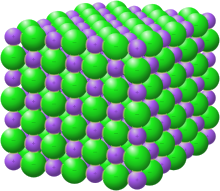
Samarium monosulfide

| |
| Identifiers | |
|---|---|
3D model (JSmol)
|
|
| |
| |
| Properties | |
| SSm | |
| Molar mass | 182.42 g·mol−1 |
| Appearance | dark brown crystals |
| Melting point | 1,940 °C (3,520 °F; 2,210 K) |
| Structure | |
| cubic | |
| Related compounds | |
Other cations
|
Neodymium sulfide |
Except where otherwise noted, data are given for materials in their standard state (at 25 °C [77 °F], 100 kPa).
| |
Samarium monosulfide is a binary inorganic chemical compound of samarium metal and sulfur with the chemical formula SmS.[1]

Synthesis
Fusion of stoichiometric amounts of pure substances:

- Sm + S → SmS
Physical properties
Samarium monosulfide forms crystals of cubic system, spatial group Fm3m, cell parameters a = 0.5970–0.5863 nm, Z = 4, structurally isomorphic with NaCl.[2]

The compound melts congruently at a temperature of 1500 °C, 1940 °C, or 2080 °C.[3]

SmS is a chalcogenide material that exists in two possible states: as a metal (also called "golden") and as a semiconductor ("blue" or "black").[4] As a result, SmS has gained considerable interest as a switchable material.[5]

Uses
Samarium monosulfide has a high sensitivity to deformation. Therefore, SmS is a promising material for creating pressure sensors of force, torque, accelerations, etc.[6]

References
- ^ Comprehensive Inorganic Chemistry II: From Elements to Applications. Newnes. 23 July 2013. p. 537. ISBN 978-0-08-096529-1. Retrieved 25 July 2024.
- ^ Okamoto, H. (1 December 2010). "S-Sm (Sulfur-Samarium)". Journal of Phase Equilibria and Diffusion. 31 (6): 577. doi:10.1007/s11669-010-9790-9. ISSN 1863-7345. Retrieved 25 July 2024.
- ^ Predel, B. (1998). "S-Sm (Sulfur-Samarium)". Pu-Re – Zn-Zr. Landolt-Börnstein - Group IV Physical Chemistry. 5 J: 1–2. doi:10.1007/10551312_2657. ISBN 3-540-61742-6. Retrieved 25 July 2024.
- ^ Volchkov, Ivan; Baskakov, Evgeniy; Strelov, Vladimir; Kanevskii, Vladimir (1 November 2022). "Thermoelectric and electrical characteristics of SmS ceramic samples after exposure to a pulsed magnetic field". Journal of Rare Earths. 40 (11): 1778–1784. Bibcode:2022JREar..40.1778V. doi:10.1016/j.jre.2022.01.008. ISSN 1002-0721. Retrieved 25 July 2024.
- ^ Sousanis, Andreas; Smet, Philippe F.; Poelman, Dirk (16 August 2017). "Samarium Monosulfide (SmS): Reviewing Properties and Applications". Materials. 10 (8): 953. Bibcode:2017Mate...10..953S. doi:10.3390/ma10080953. ISSN 1996-1944. PMC 5578319. PMID 28813006.
- ^ BOLSHEV, K. N. (2014). "Application of barorezistor from samarium monosulfide when carrying out heatphysical experiments" (PDF). ВЕСТНИК МАХ (3). Retrieved 26 July 2024.
See what we do next...
OR
By submitting your email or phone number, you're giving mschf permission to send you email and/or recurring marketing texts. Data rates may apply. Text stop to cancel, help for help.
Success: You're subscribed now !
